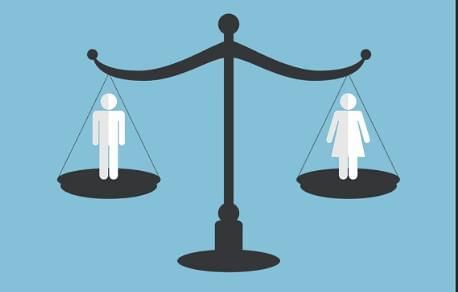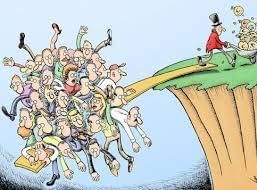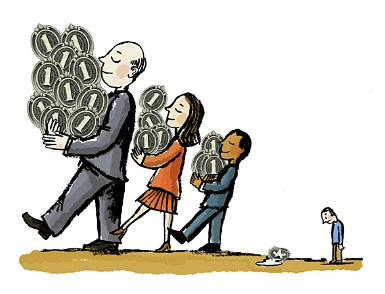Equality Class 11 Political Science
| Table of contents |

|
| Why does Equality Matter? |

|
| What is Equality? |

|
| Natural and Social Inequalities |

|
| Three Dimensions of Equality |

|
| How can we promote Equality? |

|
Equality ensures every person is valued and treated fairly, regardless of gender, race, caste, or background, without identical treatment but with equal access to opportunities and respect, fostering a society where all can realise their potential.

Why does Equality Matter?
- The idea of equality has been an important moral and political influence, motivating society for many centuries.
- As a political idea, equality supports the belief that every person has the same value, no matter their gender, race, colour, or nationality.
- It claims that all humans deserve equal attention and respect because of their shared humanity.
- Today, equality is a common ideal found in the constitutions and laws of many nations, although acceptance of this idea varies significantly across different countries.
- In recent times, the equality of all individuals has been a rallying cry in the fights against governments and social systems that maintain differences in rank, wealth, status, or privilege.
- Inequality overshadows equality globally and locally, evident in stark contrasts: slums beside luxury homes, well-equipped schools next to those without basic amenities like water or toilets, and food waste coexisting with starvation.
Paradox
- One of the biggest paradoxes today is that even though the idea of equality is widely accepted, inequality remains common in nearly every area of life.
- Social, economic, and political inequalities around the world are often supported by customs and laws that prevent certain groups from accessing specific opportunities and benefits.
- Equality is widely accepted, yet inequality persists globally and locally, seen in slums near luxury homes and well-equipped schools beside those lacking basics like water or toilets.
- These issues have concerned people for years. Addressing this paradox requires a thorough approach that recognises the complex nature of inequality and aims to build a society that fosters fairness, justice, and equal opportunities for everyone.
What is Equality?
- Treating people with equal respect does not necessarily mean treating them identically.
- No society treats all of its members equally under every circumstance.
- A smoothly functioning society requires the division of labour and functions, and individuals often have different statuses and rewards because of it.
- At times, these differences in treatment may seem acceptable or even necessary.
- For instance, providing prime ministers or army generals with a special official rank and status is typically seen as compatible with the notion of equality, as long as their privileges are not abused.
Which distinctions and differences are acceptable and which are not?
- It is unfair when people are treated differently solely due to their religion, race, caste, or gender.
- People may have different ambitions and goals, and not everyone will be equally successful.
- Believing in equality does not mean erasing all kinds of differences.
- It simply means that the treatment we receive and the chances we get should not be decided by our birth or social background.
Equality of Opportunities
- The idea of equality means that everyone deserves the same rights and chances to develop their skills and talents, and to chase their goals and dreams.
- People have various talents, which means some may achieve more success in their careers than others.
- The key issue is not the lack of equality in status, wealth, or privilege, but rather the unequal access to basic needs like education, healthcare, and safe housing, which leads to an unfair society.
- Just because only a few become top cricketers or successful lawyers does not mean society is unequal.
Natural and Social Inequalities
Natural Inequalities
- Natural inequalities occur among individuals because of their unique abilities and talents.
- These are different from social inequalities, which happen due to unequal opportunities or the exploitation of certain groups.
- Natural inequalities are seen as the result of the various traits and skills people are born with.
- It is generally believed that these natural differences cannot be changed.
Social Inequalities
- Social inequalities are formed by societal factors.
- Some societies may value intellectual work more than manual labour, leading to different rewards.
- People may be treated differently based on their race, colour, gender, or caste.
- These differences reflect societal values and can sometimes be seen as unfair.
- As a result, many theorists now distinguish between inequalities based on personal choices and those due to family or circumstances of birth.

Other Problems
- The difference between natural and social inequalities helps identify fair versus unfair treatment, but it’s not always clear.
- Long-standing inequalities, like treating women as weaker or less intelligent, were once seen as natural and justified, but now this is outdated.
- Advances in technology, like computers for the visually impaired or wheelchairs for the physically disabled, show that some "natural" differences can be overcome.
- Denying support or fair rewards to people with disabilities is now seen as unfair.
- These complexities make it hard to judge laws and policies based only on natural versus social inequalities.
Three Dimensions of Equality
Different thinkers and ideas have pointed out three key aspects of equality: political, social, and economic. To create a fairer and more equal society, we must tackle each of these three aspects of equality.
Political Equality
- In democratic societies, political equality generally means providing equal citizenship to everyone in the state.
- Equal citizenship includes fundamental rights such as the right to vote, freedom of expression, movement, association, and belief.
- These rights are essential for citizens to develop and engage in state matters.
- Significant inequality can still exist in countries that officially grant equal rights to all citizens.
- While political and legal equality alone may not be enough to establish a fair and equal society, it is still a crucial part of it.
Social Equality
- Political equality, or equality before the law, is an essential first step toward equality, but often needs to be supported by equality of opportunities.
- Legal equality removes barriers that exclude people from participating in government or accessing social benefits.
- However, true equality also requires that individuals from all groups have a fair chance to compete for opportunities.
- This means addressing social and economic inequalities by ensuring necessities like health care, quality education, proper nutrition, and a minimum wage for everyone.
- Without these, it is difficult for all members of society to compete equally, leading to wasted potential talent.
- In India, equal opportunities face unique challenges due to customs in some regions or communities.
- For instance, women may lack inheritance rights, face restrictions on certain activities, or be discouraged from pursuing higher education.
- To address this, the state must enact policies to prevent discrimination, promote education and employment for women, and ensure their safety.
- Social groups and individuals also play a vital role by raising awareness and supporting those who wish to exercise their rights.
Economic Equality
- Economic inequality exists in a society when there are significant differences in wealth, property, or income among individuals or groups. It can be measured by comparing the wealth of the richest and poorest groups or by counting the number of people living below the poverty line.
- Absolute equality in wealth or income is rare, but democracies aim for equal opportunities, giving everyone with talent and effort a fair chance to succeed.
- Inequalities may persist, but individuals can still rise through hard work.
- Some inequalities are entrenched, persisting across generations. When certain groups have enjoyed wealth and power for generations while others remain poor, society can become sharply divided. Such divisions can lead to resentment and violence.
- Reforming these entrenched systems can be difficult due to the influence of wealthy classes, but addressing these inequalities is crucial for creating a more open and egalitarian society.

Marxism and liberalism are two important political ideologies of our times that have different views on how to tackle inequality.
- Marxism: Marx viewed private ownership of key resources (e.g., oil, land, forests) as the cause of inequality, empowering owners politically and threatening democracy. Marxists/socialists see economic inequality as fueling social inequalities and advocate public control of resources.
- Liberalism: Liberals support competition as the fairest way to allocate resources, with state intervention to ensure a minimum standard of living and equal opportunities. Unlike socialists, they don’t see political, economic, and social inequalities as inherently linked and address each separately.
Feminism
- Feminism advocates equal rights for men and women, arguing that gender inequalities are not natural or necessary and can be changed.
- Inequalities stem from patriarchy, a system that values men over women and assigns them power.
- Feminists distinguish between sex (biological) and gender (social roles), e.g., women bear children, but childcare shouldn't be their sole duty.
- Patriarchy assigns women to domestic roles and men to public ones, yet many women face a "double burden" of working outside while handling household tasks.
Socialism
- Socialism is a set of political ideas that arose in response to the inequalities created and sustained by the industrial capitalist economy.
- It focuses on reducing inequality and ensuring a fair distribution of resources.
- While socialists do not entirely oppose markets, they support government regulation and control in key areas like education and health care.
- In India, the prominent socialist thinker Rammanohar Lohia identified five major inequalities that needed to be addressed simultaneously:
1. inequality between men and women,
2. inequality based on skin colour,
3. caste-based inequality,
4. colonial domination, and
5. economic inequality. - Many socialists in Lohia’s era saw class inequality as the sole issue, believing other inequalities would vanish once economic disparity was addressed.
- Rammanohar Lohia disagreed, arguing that each inequality (gender, skin colour, caste, colonial domination, economic) has distinct roots and requires separate action.
- Lohia’s "Sapta Kranti" (seven revolutions) includes these five, plus civil liberties (against unjust privacy intrusions) and non-violence (promoting Satyagraha over weapons).
How can we promote Equality?
We need to consider whether the use of affirmative action is justified for the purposes of bringing about equality.
Establishing Formal Equality
- The first step towards bringing about equality is ending the formal system of inequality and privilege.
- Social, economic and political inequalities all over the world have been protected by customs and legal systems that prohibited some sections of society from enjoying certain kinds of opportunities and rewards.
- Attainment of equality requires that all such restrictions or privileges be brought to an end. This is what the Indian Constitution does.
- The Constitution prohibits discrimination on grounds of religion, race, caste, sex or place of birth. The Indian Constitution also abolishes the practice of untouchability.
- Most modern constitutions and democratic governments have formally accepted the principle of equality and incorporated it as identical treatment by law to all citizens without any regard to their caste, race, religion or gender.
Equality Through Differential Treatment
- Sometimes it is necessary to treat people differently to ensure that they can enjoy equal rights.
- For example, disabled people may justifiably demand special ramps in public spaces so that they get an equal chance to enter public buildings.
- Some countries have used policies of affirmative action to enhance equality of opportunity. In India, we have relied on the policy of reservations.
Affirmative Action
- Affirmative action goes beyond formal legal equality, aiming to provide equal opportunities through measures like scholarships, hostels, or reserved seats in education and jobs for disadvantaged groups.
- In India, quotas for deprived groups spark debate, with critics arguing they unfairly limit equal treatment for others.
- Affirmative action is meant to be temporary, designed to help excluded groups (e.g., Dalits, women) compete fairly.
- Equal opportunity requires distinguishing between identical treatment and treating everyone as equal; special treatment needs careful justification.
- Education and healthcare often fail deprived populations, perpetuating social and economic inequalities.
- Policies must be evaluated for their success in creating a fair, egalitarian society.
- The women’s movement highlighted these issues, demanding equal rights (e.g., voting, education, work) in the 19th century and recognising the need for special facilities to enable women to exercise these rights.
- They demanded, for instance, the right to vote, the right to receive degrees in colleges and universities and the right to work — that is, the same rights as the men in their society.
|
43 videos|268 docs|39 tests
|
FAQs on Equality Class 11 Political Science
| 1. Why does Equality Matter? |  |
| 2. What is Equality? |  |
| 3. How can we promote Equality? |  |
| 4. What are the Three Dimensions of Equality? |  |
| 5. What are Natural and Social Inequalities? |  |
















